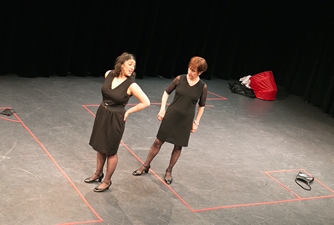An audience of modest dimensions was present at the Carswell Concert Hall of Meredith College for the traversal of Schubert’s famous song-cycle, Die schöne Müllerin (The Maid of the Mill, although that is hardly an adequate translation), performed by baritone DeMar Austin Neal IV, with accompanist Katherine Thomas. But, indeed, the hall should have been packed, for Neal turned in an interpretation of this masterwork that was on the very highest level (local presenters, are you listening?). Neal is still very young (his CV lists performances beginning in 2005), and a large part of the success of his interpretation was his ability to inhabit the role of the young Miller, naïve, romantic, someone who easily can fall in love with the young daughter of the Mill, where he, along with other apprentices work.
Neal is a baritone, but his voice is bright, with the shine of a tenor, and without the darker hues that so often causes composers to cast baritones as villains. His technique was assured, with no flaws audible at either the top or bottom of the range, perfect intonation, the ability to modulate expressively to a piano dynamic, and his diction was absolutely crystal-clear (not so common among vocalists, who often make compromises in diction for reasons of tone) – you could have taken dictation from his perfect German pronunciation. It is also important to highlight the importance of his acting, in which eyes, faces, body and gesture all collaborated, and even the weight of the vocal tone (heavier when he sung of the heavy millstones in the opening song, more mature when the master speaks to the apprentices in “Am Feierabend”).
The Miller’s naïve passion for the young daughter must confront competition from the Hunter, and Neal realistically showed the irritated jealousy of the Miller (who has scarcely come close to a real relationship with the young woman, who speaks only five lines among the twenty poems and six pages of poetry). And finally, things come to the expected bad end, with the mill-stream watching over the corpse of the suicide, who has found tranquil rest under the waters, where he will sleep “until everything wakes.” Neal (as the stream) gazes into the newly starry sky, after singing the long and tranquil lullaby. His accompanist, Katherine Thomas, played her part perfectly, sympathetically supporting the vocalist and framing the musical images with which Schubert depicts the imagery of the poetry. All in all, a performance to remember, and one which showed the talent and skills of a North Carolina vocalist who deserves to be heard more widely. I hope he will continue to explore the song repertoire.











